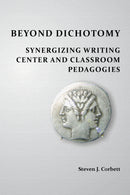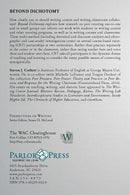Steven J. Corbett
Perspectives on Writing
Series Editor, Susan H. McLeod
Information and Pricing
978-1-60235-631-3 (paperback, $24); 978-1-60235-659-7 (hardcover, $50); 978-1-60235-632-0 (PDF, $19.99) © 2015 by Steven J. Corbett. 159 pages with notes and bibliography.
Bookstores: Order by fax, mail, or phone. See our "Sales and Ordering Page" for details.
Description
How closely can or should writing centers and writing classrooms collaborate? Beyond Dichotomy explores how research on peer tutoring one-to-one and in small groups can inform our work with students in writing centers and other tutoring programs, as well as in writing courses and classrooms. These multi-method (including rhetorical and discourse analyses and ethnographic and case-study) investigations center on several course-based tutoring (CBT) partnerships at two universities. Rather than practice separately in the center or in the classroom, rather than seeing teacher here and tutor there and student over there, CBT asks all participants in the dynamic drama of teaching and learning to consider the many possible means of connecting synergistically.
About the Author
Steven J. Corbett is Assistant Professor of English at George Mason University. He is co-editor (with Michelle LaFrance and Teagan Decker) of the collection Peer Pressure, Peer Power: Theory and Practice in Peer Review and Response for the Writing Classroom (Fountainhead Press, 2014). His essays on teaching, writing, and rhetoric have appeared in The Writing Center Journal, Rhetoric Review, Pedagogy, Kairos, The Writing Lab Newsletter, Interdisciplinary Studies in Literature and Environment, Inside Higher Ed, The Chronicle of Higher Education, and elsewhere.
Contents
Acknowledgments
Introduction
Sharing Pedagogical Authority: Practice Complicates Theory When Synergizing Classroom, Small-Group, and One-to-One Writing Instruction
1 Tutoring Style, Tutoring Strategy: Course-Based Tutoring and the History, Rhetoric, and Reality of the Directive/Nondirective Instructional Continuum
2 Methods and Methodology: Locating Places, People, and Analytical Frames
3 Macro- and Micro-Analyses of One-to-One Tutorials: Case Studies at the University of Washington
4 Conflict and Care while Tutoring in the Classroom: Case Studies at the University of Washington and Southern Connecticut State University
5 Conclusion: Toward Teacher/Student, Classroom/Center Hybrid Choices
Works Cited
Appendix
Index
About the Author







